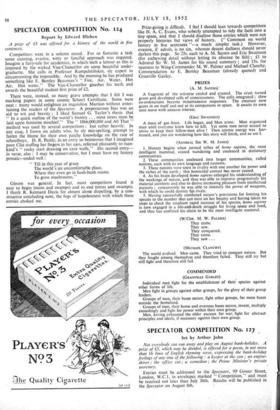SPECTATOR COMPETITION No. 124 Report by Edward Blishen A prize
of £5 was offered for a history of the world in five sentences.
Competitors were in a solemn mood. For so fantastic a task some cunning, evasive, witty or fanciful approach was required. Imagine a fairy-tale for academics, in which- Finch a labour as this is imposed by the wicked Vice-Chancellor on some beautiful under- graduette. She calls in Professor Rumpelstiltslcin, sly. expert in circumventing the impossible. And by the morning he has produced something like E. Bentley Beauman's "Fire. Air. Water. Hot Air. Hot water." The Vice-Chancellor gnashes his teeth and awards the beautiful student first prize of £2.
There were, instead, so many grave attempts that I felt I was marking papers in some cosmic School Certificate. Some were neat : many would enlighten an inquisitive Martian without enter- taining the readers of the Spectator. A preposterous bias was an aid to wit and brevity ; I liked Samuel G. Taylor's thesis that "In a quick outline of the world's history. . . most stress must be laid upon feminine mischief." The" 1066,000,000 and All That" method was used by several competitors : but rather heavily. In any case, I frown on adults who, by sly mis-spelling, attempt to fasten the blame for their own patchy knowledge on the race of schoolboys. D. R. Peddy, in an entry so boisterous that I imagined poor Clio stuffing her fingers in her ears, referred pleasantly to man- kind's "rocky start drawing on cave walls." His second entry— in verse, alas : I may be conservative, but I must have my history prosaic—ended well : "Till in this year of grace The world's an uncomfortable place, Where they even go in hush-hush rooms To grow mushrooms."
Gloom was general. In fact, most competitors found it easy to begin (mists and swamps) and to end (mists and swamps).
I thank R. Kennard Davis for almost alone dispelling, by a con- structive concluding note, the fogs of hopelessness with which these entries choked me. Prize-giving is difficult. I feel I should lean towards competitors like H. A. C. Evans, who soberly attempted to tidy the facts into a tiny space, and that I should disallow those entries which were not properly histories but views of history. (" Comment on world history in five sentences "—a much simpler task.) However, evasion, if adroit, is no sin, whereas decent dullness should never darken this page. So 25s. each to A. M. Sayers and Eric Swainson (for eschewing detail without letting its absence be felt) ; Ll to Admiral Sir W. M. James for his sound summary ; and 15s. for neatness to Wing-Commander M. W. Palmer and Michael Clanchy. Commendation to E. Bentley Beauman (already quoted) and Granville Garley.
PRIZES
(A. M. SAYERS)
A fragment of the universe cooled and crusted. The crust turned green and developed cells of consciousness. The cells integrated ; slow co-ordinations became instantaneous responses. The creature now gazes in on itself and out at its companions in space. It awaits its own next move with anxious interest.
(ERIC SWAINSON)
A mass of gas froze. Life began, and Man arose. Man organised man until everyone knew how to kill. Yet some men never ceased to strive to keep their fellow-men alive ! Then atomic energy was har- nessed, and you are wondering how this story will finish, and so am I.
(ADMIRAL SIR W. M. JAMES)
1. History begins when nomad tribes of homo sapiens, the most intelligent mammal, ceased wandering and coalesced in stationary communities.
2. These communities coalesced into larger communities, called nations, each with its own language and customs. 3. These nations were soon in rivalry with one another for power and the riches of the earth ; this homicidal contest has never ceased.
4. As his brain developed homo sapiens enlarged his understanding of the workings of nature, and thus was able to improve progressively his material comforts and also to derive increasing pleasure from intellectual pursuits ; concurrently he was able to intensify the power of weapons, with which he could destroy his rivals.
5. Having successfully combated nature's provisions for limiting his species to the number that can exist on her bounty and having taken no steps to check the resultant rapid increase of his species, homo sapiens is now engaged in a life-and-death struggle for living space and food, and thus has confuted his claim to be the most intelligent mammal.
(W/CDR. M. W. PALMER)
They came. They saw.
They conquered.
They came.
They saw ...
(MICHAEL CLANCHY) The world evolved. Men came. They tried to conquer nature. But they fought among themselves and therefore failed. They still try but still fight and therefore still fail.
COMMENDED (GRANVILLE GARLEY)
Individual men fight for the establishment of their- species against other forms of life.
Men fight in groups against other groups, for the glory of their group leaders.
Groups of men, their bases secure, fight other groups, for more bases outside the homeland.
Groups of men, their home and overseas bases secure, invent, multiply exceedingly and fight for power within their own group.
Men, having exhausted the older excuses for war, fight for abstract principles and ideals, if necessary against their own group.


































 Previous page
Previous page